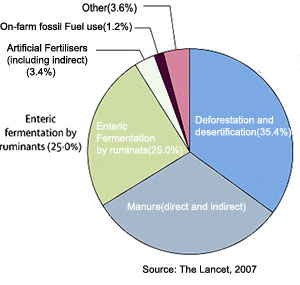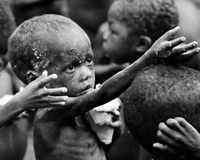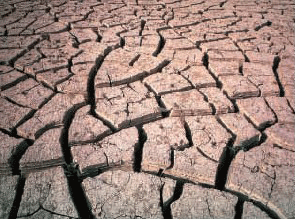"The livestock sector generates more greenhouse gas emissions as measured in CO2 equivalent – 18 percent – than transport. It is also a major source of land and water degradation."
ООН -Длинная тень скота (2006)
Full PDF -408 page UN Report
This summary (1-page PDF)
Основное решение проблемы перемены климата - Веганство
 Supreme Master Ching Hai - a world-renowned spiritual teacher, artist, and humanitarian
Supreme Master Ching Hai - a world-renowned spiritual teacher, artist, and humanitarian
"The root of our problem is that we have been unkind to our co-inhabitants: the living, feeling, walking, acting, loving beings, like animals, of all size and shapes. And we have also been unkind to our environment. We have been massacring our co-inhabitant animals, and we have been destroying our environment, like deforesting and destroying the water and destroying the air. So, in order to solve the problem that we are facing right now, we have to reverse our actions. We have to be kind to our co-inhabitants. Instead of killing them, massacring them, sacrificing them, we have to take care of them. And instead of deforestation, we have to plant trees again. Take care of whatever environment that we have." еще
 Dr. James Hansen - NASA's top climatologist
Dr. James Hansen - NASA's top climatologist
"There are many things that people can do to reduce their carbon emissions, but changing your light bulb and many of the things are much less effective than changing your diet, because if you eat further down on the food chain rather than animals, which have produced many greenhouse gases, and used much energy in the process of growing that meat, you can actually make a bigger contribution in that way than just about anything. So, that, in terms of individual action, is perhaps the best thing you can do."
"My message to you is: Be Veg, Go Green, Save the Planet."  Показать видео |
Показать видео |  Спрятать видео
Спрятать видео
The impact of meat production & consumption on climate change
 Мясо и перемена климата
Мясо и перемена климата
- The report from Worldwatch Institute shows that livestock raising is responsible for at least 51 percent of global warming.*
- A Netherlands Environmental Assessment Agency report showed that global shift to vegan diet could cut climate change mitigation costs by 80% *
- According to the UN report “Livestock’s Long Shadow,” livestock production is the greatest contributor to global warming.*
- Animal waste and feed cropland dump more pollutants into our waterways than all other human activities combined.
- Meat-based diets require 10-20 times as much land as plant-based diets – nearly half of the world's grains & soybeans are fed to animals.
|

Proportion of GHG emissions from different parts of livestock production | Livestock production emissions: 18%
Global Transportation emissions: 13.5%
18% of all greenhouse-gas emissions from human activities, including:
9% of CO2
37% of CH4(methane) - 23 times the Global Warming Potential of CO2 over 100 years, 72 times over 20 years
65% of N2O (nitrous oxide) -296 times the Global Warming Potential of CO2 over 100 years, 275 over 20 years
Source: FAO, 2006 (1) |
| Producing 1kg beef: - Leads to the emission of greenhouse gases with a warming potential equivalent to 36.4 kg of CO2 .
- Releases fertilising compounds equivalent to 340 g. of sulphur dioxide and 59 g. of phosphate.
- Consumes 169 megajoules of energy .
- 1 kg of beef is responsible for the equivalent of the amount of CO2 emitted by the average European car every 250 km, and burns enough energy to light a 100-watt bulb for 20 days.
- Over two-thirds of the energy goes towards producing and transporting the animals' feed.
Source: Animal Science Journal, 2007 | " the permafrost layer is melting each day. And the methane gas,or other gas even, are releasing into the atmosphere. I really hope and pray that someone is listening.Methane and nitrous oxide is made by stock raising, stock keeping, animals keeping. So they are far more poisonous, far more dangerous than CO2.
Because the atmosphere is getting warmer and so the methane is bubbling out. If we stop the worst cause of global warming,meaning stock raising, animal breeding,then we will be able to save the planet. We have to stop the killing of man or animals. We have to stop producing animals products. And we have to stop using it."
- Supreme Master Ching Hai - 6 July 2008– London Conference (2)
|
|
 Deforestation
Deforestation
 |
Deforestation playing a major role in climate change. More than 300 experts stated, “If we lose the forests, we lose the fight against climate change.” But Amazon deforestation increases 69 percent due to demand for meat during Aug 2007 and Aug 2008 . The livestock sector is by far the single largest anthropogenic user of land
- Livestock production accounts for 70% of all agricultural land and 30% of the world’s surface land area
- 70% of previous forested land in the Amazon is occupied by cattle pastures, and crops for animal feed cover a large part of the remainder
- 20% of pasture land is degraded because of overgrazing, compaction and erosion
Source: FAO, 2006; Goodland R. et al,1999 |
" Everything has something. Like trees, they are there to give oxygen to the planet. Without trees, we die. Really, we will. We die without trees. The water will be less because there are no trees to attract water and to keep water when it is there.
So, everything on this planet, including us, is inter-related and helping each other to make our lives here comfortable and livable, comfortably. But if you we don't know that, we are killing ourselves. Every time we kill a tree, or kill an animal,we are killing a little part of ourselves. "
- Supreme Master Ching Hai - 6 Jun 2001– Florida, USA
|
 Food Shortage
Food Shortage
 Rising food prices have plunged an additional 75 million people below the hunger threshold, bringing the estimated number of undernourished people worldwide to 923 million in 2007.(1) Rising food prices have plunged an additional 75 million people below the hunger threshold, bringing the estimated number of undernourished people worldwide to 923 million in 2007.(1)
But are we really short of food?
1/3 of the world’s cereal harvest and over 90% of soya is used for animal feed, despite inherent inefficiencies. Grain currently fed to livestock is enough to feed 2 billion people.
It takes 10 kg of animal feed to produce 1 kg of beef
4 to 5.5 kg of grain to produce 1 kg of pork
2.1 to 3 kg of grain to produce 1 kg of poultry meat
Source: FAO, 2006; CAST 1999; B. Parmentier, 2007
"Everything else takes too long and we don’t have time. So we have to choose the vegetarian diet; no more animals breeding. Choose organic farming, helping each other, sharing the food that we have.
Because if we are vegetarian, all of us, we will have so much food to share with everybody; no one will ever go to sleep hungry at night anymore. And then we will have saved a lot of time, energy, money to help them also combat disease and rebuild their lives. Everything’s possible, because there will be no more war, even with animals. Peace begins at home."
- 2008 Critical Moments to Save the Planet: What Can I Do? Seminar -June 29, 2008(2) |
 Water Shortage & Pollution
Water Shortage & Pollution
 We are seeing severe drought with cracking lands, followed by massive flooding and destruction of agricultural products and other properties in an unprecedented scale.and every day, 30,000 children in the world die from diseases linked to water. (1) We are seeing severe drought with cracking lands, followed by massive flooding and destruction of agricultural products and other properties in an unprecedented scale.and every day, 30,000 children in the world die from diseases linked to water. (1)
70% of all water goes to producing food(3) and livestock is among the largest sectoral source of water pollution and responsible for 64% of ammonia emissions, which contribute to acid rain.
One factory farm creates more water pollution than the city of Houston, Texas.(4)
4664 liters of water to produce 1serving of beef but entire vegan meal need only 371 liters water.(5) Scientists have calculated that we would actually save more water by forgoing one pound of beef, or four hamburgers, than by not showering for at least six months (6)
"Yes. And a vegetarian diet will stop 80% of global warming, stop all the cruelty, beginning on our plate. Generating loving, kind energy around the world, stop water shortage and water pollution, stop food shortages, stop world hunger and war, prevent deadly diseases, save enormous tax and medical bills to build a better world, and support new useful inventions and good people’s organizations."
- An Interview with Supreme Master Ching Hai by James Bean of Spiritual Awakening Radio -July 29, 2008 - USA (7) |
 Overfishing and Dead zones
Overfishing and Dead zones
Fish fed to farmed animals threaten the ocean’s ecosystem and One-third of world fish catch used for animal feed. The results of a nine-year study by the Institute for Ocean Conservation Science at Stony Brook University and the University of British Columbia found that an alarming 28 million tons of ocean fish are currently being ground up and fed to factory-farmed fish, pigs and chickens.
Dr. Ellen K. Pikitch of Stony Brook University stated, “…It’s an enormous percentage of the world’s fish catch. Skyrocketing pressure on small wild fishes may be putting entire marine food webs at great risk.”
A report by the US-based research and education organization World Policy Institute stated that expanded fishing practices has created a perilous situation for ocean life. A 2003 study showed that 90 percent of the large fish in the oceans had disappeared in the previous 50 years, and the World Policy Institute is now calling for the monies spent on subsidies to the fishing industries to instead be used to create large marine reserves.
The ocean is acidifying from absorbing too much carbon dioxide, and warm temperatures force animals into new habitats. So-called “dead zones” devoid of life can be found spanning areas as large as tens of thousands of square miles. These are caused by both pollution and overfishing.
The United Nations Food and Agriculture Organization has reported that up to 80 percent of fished species are now on their way to extinction.
" Fish eating is also very depleting to planetary ecosystem. They have proven that overfishing of sardines has resulted in many dead zones. Because they are there for some reason. They are there for maybe oxidizing the ocean, give life to some other kind of species or cleaning the environment. Whatever the species that God has left on the planet, they have work to do. Just like humans, we have work to do. Animals, they have work to do. It's just many humans think they're useless so they fish them up and eat them. But they're very, very useful to our ecosystem."
Supreme Master Ching Hai - Videoconference with Hamburg Center, Germany – July 18, 2008
|
 Болезни связанные с мясом
Болезни связанные с мясом
Some Diseases Related to Meat Consumption
- Blue tongue disease
- E. coli
- Salmonella
- Bird flu
- Mad cow disease
- Pig's disease (PMWS)
- Listeriosis
- Shellfish poisoning
- Pre-eclampsia
- Swine flu
SOME OF THE COSTS OF MEAT EATING:
HEART DISEASE
- Over 17 million lives lost globally each year
- Cost of cardiovascular disease is at least US$1 trillion a year
CANCER
- Over 1 million new colon cancer patients diagnosed each year
- More than 600,000 colon cancer-related mortalities annually
- In the United States alone, colon cancer treatment costs about US$6.5 billion.
- Millions of people are newly diagnosed with other meat-related cancers every year.
DIABETES
- 246 million people are affected worldwide
- An estimated US$174 billion spent each year on treatment.
OBESITY
- Worldwide 1.6 billion adults are overweight with 400 million more who are obese
- Costs US$93 billion each year for medical expenses in the United States alone.
- At least 2.6 million people die annually from problems related to being overweight or obese
PLUS MORE…
|
 Resources
Resources
 |
Assessing The Environmental Impacts of Consumption and Production (2010) |
| - UNEP |
 |
The health benefi ts of tackling climate change - An Executive Summary for The Lancet Series |
| - The Lancet |
 |
Livestock and Climate Change |
| - Worldwatch Institute |
 |
Organic: A Climate Saviour? |
| - the Institute for Ecological Economy Research (IÖW) |
 |
Livestock Consumption and Climate Change: A Framework for Dialogue |
| - Food Ethics Council (FEC) as part of WWF’s One Planet Food programme |
 |
Slaughtering the Amazon |
| - Greenpeace |
 |
Cool Farming:Climate impacts of agriculture and mitigation potential (2008) |
| - Greenpeace |
 |
Climate benefits of changing diet (Free Preview - 2009) |
| - Elke Stehfest , Lex Bouwman, Detlef P. van Vuuren, Michel G. J. den Elzen, Bas Eickhout and Pavel Kabat |
 |
Food-Miles and the Relative Climate Impacts of Food Choices in the United States (2008) |
| - Carnegie Mellon University |
 |
Putting Meat on The Table: Industrial Farm Animal Production in America (2008) |
| - Executive Summary , Pew Commission on Industrial Farm Animal Production |
 |
American Meat: A Threat to Your Health and to the Environment (2004) |
| - Polly Walker,M.D.,M.P.H.&Robert S. Lawrence,M.D. |
 |
Happier Meals: Rethinking the Global Meat Industry. (2005) |
| - Worldwatch Paper 171 |
 |
Meat's Carbon Hoofprint (2007) |
| - Prof Barry Brook and Geoff Russell |
 |
The Economic Impact of Global Warming on Livestock Husbandry in Kenya (2008) |
| - Jane Kabubo-Marian,PhD School of Economics,University of Nairobi |
 |
Livestock's Long Shadow (2006) |
| - United Nations Food and Agriculture Organization |
 |
The livestock industry and climate (2007) |
| - Jens Holm & Toivo Jokkala |
 |
Cooking up a storm: Food, greenhouse gas emissions and our changing climate (2008) |
| - Food Climate Research Network |
 |
Saving Water: From Field to Fork - Curbing losses and wastage in the food chain (2008) |
| - Stockholm International Water Institute, International Water Management Institute, Chalmers, and Stockholm Environment Institute. |
 |
Can Britain Feed Itself? -Simon Fairlie( 2007) |
| - The Land |
 |
The Cattle Realm: A new phase in the livestock colonization of Brazilian Amazonia (2008) |
| - Amlgos da Terra |
|
|
еще
Climate Change Public Service Announcements
 Supreme Master Ching Hai - a world-renowned spiritual teacher, artist, and humanitarian
Supreme Master Ching Hai - a world-renowned spiritual teacher, artist, and humanitarian  Dr. James Hansen - NASA's top climatologist
Dr. James Hansen - NASA's top climatologist ![]() Показать видео |
Показать видео | ![]() Спрятать видео
Спрятать видео Dr. Rajendra Pachauri - The chairman of the Intergovernmental Panel on Climate Change (IPCC)
Dr. Rajendra Pachauri - The chairman of the Intergovernmental Panel on Climate Change (IPCC) ![]() Показать видео |
Показать видео | ![]() Спрятать видео
Спрятать видео Мясо и перемена климата
Мясо и перемена климата Deforestation
Deforestation Food Shortage
Food Shortage Water Shortage & Pollution
Water Shortage & Pollution Overfishing and Dead zones
Overfishing and Dead zones Болезни связанные с мясом
Болезни связанные с мясом Resources
Resources


 Rising food prices have plunged an additional 75 million people below the hunger threshold, bringing the estimated number of undernourished people worldwide to 923 million in 2007.
Rising food prices have plunged an additional 75 million people below the hunger threshold, bringing the estimated number of undernourished people worldwide to 923 million in 2007. We are seeing severe drought with cracking lands, followed by massive flooding and destruction of agricultural products and other properties in an unprecedented scale.and every day, 30,000 children in the world die from diseases linked to water.
We are seeing severe drought with cracking lands, followed by massive flooding and destruction of agricultural products and other properties in an unprecedented scale.and every day, 30,000 children in the world die from diseases linked to water.